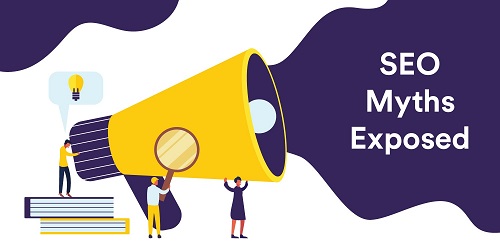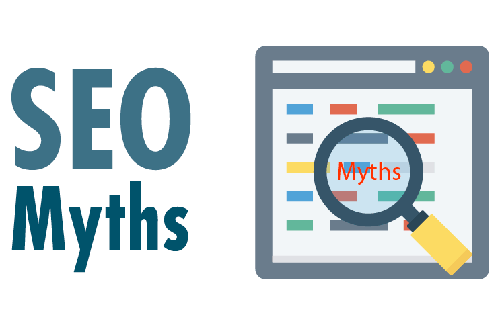Debunking SEO Myths
 There are a lot of misconceptions about SEO that trick copywriters into making mistakes when writing copy for the internet. These common myths about SEO have led to Google penalizing websites for not following good SEO practices.
There are a lot of misconceptions about SEO that trick copywriters into making mistakes when writing copy for the internet. These common myths about SEO have led to Google penalizing websites for not following good SEO practices.
When it comes to good search engine optimization, there are standard practices that SERPs look at to rank a website. We drill down on how to stop buying into SEO myths that won’t get your site ranking.
SEO Myths and Facts
It is an already established fact that Google uses multiple ranking factors to position websites and content. Therefore, it is prudent for digital marketers to not only satisfy a few factors that are easily attainable while ignoring the ones that aren’t as basic.
In saying that, it is true that while you probably won’t know what Google’s algorithms look for with absolute certainty when crawling a webpage, there are a few SEO myths that could damage your website’s potential. Here’s a list of the top 10 SEO myths debunked:
1. Keywords Density Improves Page Ranking
While having keywords on your web page matters a great deal, it can easily become the source of all your difficulties when trying to get your site ranking.
Over the years, Google has gotten smarter at identifying content that uses black hat techniques to gain traction. The Google bots use the Term Frequency-Inverse Document Frequency to scan the copy of your content and identify the frequency.
Additionally, copywriters should be aware that Google can interpret synonyms, word stems like “s” and “ing”, and other long-tail variations of a keyword.
2. Are Links Really that Important?
Google’s most important ranking factor according to Webmaster Trends Analyst Gary IIlyles is PageRank. PageRank is purely about links and link building. Unlike content, it’s the one element that’s difficult to game at scale.
“Links are the best input that Google has for understanding how popular something is on the web.”
Google gauges a site’s authority based on the links it has. Like most things in life, it’s not the size that matters. Basically, this means that Google looks at the quality of the link (the site that links to your website, its own authority, and if it is a natural link).
3. If Content is King, What is the Queen?
SERPs are always looking for new content and alternative ways of answering people’s queries. Therefore, the content will always be king! It gives Google guidance on what search queries to rank your site on. But links tell Google how high to rank it.
At the crux of it, content and links are like the king and queen of the SEO chessboard. For you to rank prominently, both facets of your website must be handled with great care. You need to couple great content with a sound link building strategy.
Building links from any website to point to your webpage is actually working backward. Any link that is easy to come by is not a link worth buying.
4. SEO is a One-Time Thing
There’s a huge misconception that once you get SEO right and you rank #1, your job is done. In reality, SEO is much like hitting the gym. For optimal results, it is a continuous activity where you go back and forth, optimizing the content for better results.
If you stop optimizing the site, the traffic will slowly start declining because what worked in 2020 won’t be effective in 2021. Also, as much as content loses its freshness, there’s also what is known as ‘link rot’, and you could start losing backlinks overtime.
5. Google Only Ranks ‘Fresh’ Content
Many have tried to keep the freshness of the website by republishing content, which is something we have all done at some point. The ‘freshness’ of a page should be dependent on the focus keyword and query to get the best results. This means that it may work for some pages based on the query, and not so much for others.
It’s important to understand that evergreen pages are considered evergreen for a reason. Those are your cornerstone pages and should not change as often. Also, you shouldn’t optimize content for the fun of it. Your overall optimization should impact the quality of the content.
You can avoid content decay by tracking your ranking pages on the search console and other ranking tools. Once you start seeing a decline, it means it’s time for a facelift.

6. Number of Links on the Page Doesn’t Matter
The greater the number of links on a web page, the less those links are worth. Page real-estate is important. The links that are on a page and the position they are in on your site lets Google bots know how important they are.
If a link is available to anybody, by definition, it’s a bad link. This also relates to the type of backlinks you get for your website. Google is able to recognize that links to porn sites, and other dodgy platforms that try to sell users on their products.
7. Social Media Help Rankings
Google’s John Mueller expanded on the fact that social signals like Facebook, Twitter, and Pinterest, do not impact rankings directly. However, social media is another tool that when done well, will get your site more exposure.
That doesn’t necessarily mean that social media postings aren’t helpful in getting your page to rank. If you can get the people to share your content and link to it in a way that Google counts it as a “link”, it’s good SEO.
8. Only the #1 Position on Google Matters
While it is great to rank number one, it’s not the end-all and be-all. When you are ranked #1 for organic searches, your web page will get between 35%-49% of the clicks. Only about 3% – 4% of clicks go to Google ads.
From then on, around 15% to 10% is shared between the sites on the first page, with the figure dropping down to 2% for the site on the bottom of page 1.
There is the suggestion that making your metas pop out can attract people to your site. For example, using structured data, websites can improve how their pages look, such as making your review engine display star ratings for products.
9. Page Speed Isn’t That Important
Google uses page speed to break the tie between pages when all other ranking factors are equal. This is because a faster site is much easier for Googlebot to crawl.
When the website takes time to crawl, it takes longer for the bots to get your site indexed. This can happen either in the longer time spent checking the number of pages or the content on the page. Ultimately, load speed is important as we move to mobile-first indexing.

10. Because Your Competitors Do It, It Must Be Good!
When researching a topic, you have to consider what has already been written on the topic. However, what one site does may work for them and may not produce the same results for you.
This is because it could be more than just the content that makes the page rank for that query. It is important to understand that your users have different queries and user intent when they get to your site.
A good compromise is if you want to try something you see on another site, you should find a section of yours that isn’t bringing in a lot of traffic and then A/B test the idea.
Tip of the day, don’t copy established websites. Find what works for your users and stick to that.


